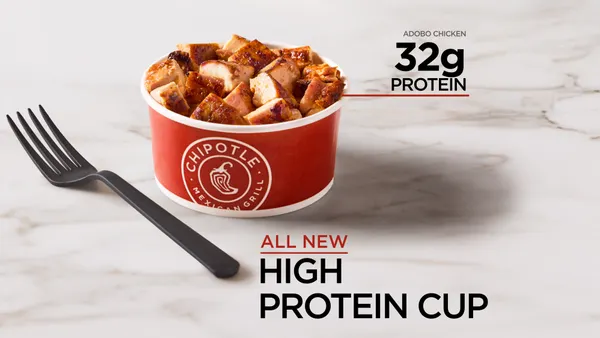Dive Brief:
- The Coalition for Safer Food Processing and Packaging, an environmental group, discovered that vinyl gloves used at McDonald's, Burger King and Wendy's contain chemicals that could harm human health, reports Business Insider.
- The chemicals, called phthalates, are linked to reproductive issues in men and women and can impede brain development in children, according to the study. In June, the Maine legislature banned the presence of phthalates in food packaging.
- The study tested over 100 gloves from 32 U.S. distributors and used at 15 restaurant chains in the U.S.
Dive Insight:
In 2016, more than one-third of consumers described chemicals in their food as the most important food safety issue, according to data from the Environmental Defense Fund, representing a steady increase since 2011. Carcinogens cause the most worry among consumers, with 39% expressing a desire to avoid anything that may be linked to cancer.
If consumers learn that some of the new packaging products being used at their favorite chains aren't as eco-friendly or as healthy as they believed, it could chip away at their sense of trust and approval for that brand. Future offerings from the company will be held to a higher level of scrutiny and consumers may demand more extensive testing and research before other eco-friendly offerings are rolled out brand-wide.
The Coalition of Safer Food Processing report follows a recent investigation from The New Food Economy which found that the compostable fiber bowls used at chains including Chipotle and Sweetgreen contain PFAS, a class of chemicals that have no known half-life and that have been linked to cancer. The chemicals do not biodegrade naturally, meaning that even if the bowl materials end up in the right composting facility, the chemicals will stay in the environment indefinitely, damaging the soil and polluting any local waterways.
These studies could be causing worry at the several other QSR and fast casual brands that have recently made efforts to improve their packaging policies. Many restaurants are swapping out their existing plastic or Styrofoam takeout materials in response to growing consumer concern regarding waste and recycling. KFC committed to using 100% recoverable or reusable plastics for its consumer products by 2025, for example, while Starbucks and McDonald's are leading a consortium dedicated to identifying packaging alternatives. McDonald's is also testing two "green concept" restaurants in Ontario and Vancouver that will serve as incubators for new packaging options and recycling initiatives.
Last year was the year of the "sustainable shopper" according to Nielsen, meaning more consumers are looking for companies that are taking steps to improve their environmental footprint and to make it easier for consumers to reduce their environmental impacts. Americans spent $128.5 million on sustainable fast-moving consumer goods in 2018 and 48% of U.S. consumers surveyed said they would likely change their purchasing habits to meet environmental standards. This has created a financial incentive for companies to "go green" by changing their sourcing practices or using more eco-friendly packaging.










